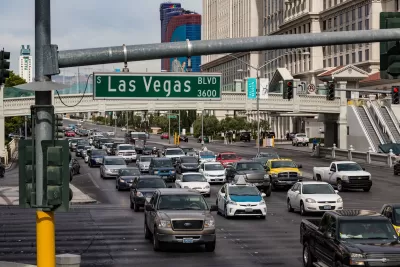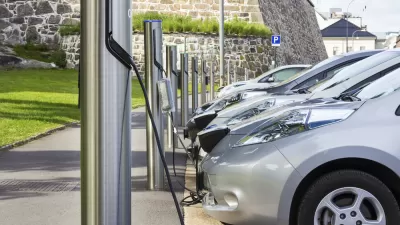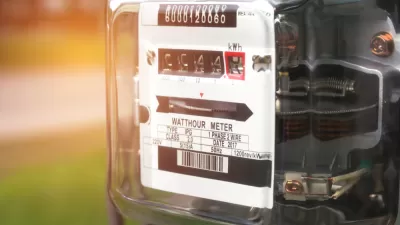Nevada is one of 15 states in the Western Road Usage Charge Consortium that are considering a transition from funding their transportation budgets largely by taxing the gallons of fuel that vehicles burn to charging drivers for miles driven.

Several of the states in the Western Road Usage Charge Consortium, including Washington, Colorado, and California, have run pilot programs where a limited number of volunteers recorded and transmitted mileage data to determine how much they would have paid under a mileage fee program. The Nevada Odometer Reading Pilot Program will be different in that its sole focus is annual data collection, will not involve technology, and every motorist in the state will be required to participate.
"The program, established in a law passed by the Nevada Legislature, will give lawmakers information on the total miles that drivers travel in the state each year, data that could be used to establish a 'miles-traveled' tax that would help fund road projects in lieu of the state’s existing fuel tax," reports Kate Elizabeth Queram for Route Fifty, a division of Atlantic Media, which also administers CityLab.
The pilot, which begins in October and runs through the end of 2026, directs officials with the state Department of Motor Vehicles to collect odometer readings when motorists sell or register their cars (registration renewals will also be included). [Odometer readings will also be recorded when vehicles have emissions tests.]
Motorcycles and mopeds are exempt, but mileage is required from every other vehicle, including cars (gas and electric), trucks, buses and RVs.
There are no fees involved with the program and no penalty for not complying with it. The data “will be used only to compile reports of total miles driven for the Nevada Legislature,” according to the Nevada DMV.
However, motorists who don't provide their odometer reading will be unable to renew online – they must do so in person, according to the FAQ.
Why pursue a mileage fee?
Revenue from state fuel excise taxes, which state departments of transportation use to fund their budgets, have been lagging as many state legislatures and governors are either unable or unwilling to increase the tax to keep up with expenditures.
Times are changing though. More than 30 states have raised or reformed their gas taxes since Republican Gov. Matt Meade signed a 10 cent per gallon increase in Wyoming's gas tax on Feb. 15, 2013, according to Carl Davis, research director of the Institute on Taxation and Economic Policy (ITEP). But Nevada is not one of them. The 23 cents per gallon state gasoline excise tax was last increased by 2.5 cents per gallon almost 27 years ago in October 1992.
In addition, a road usage charge would ensure that motor vehicles that don't burn gas or diesel fuel, and thus pay no fuel taxes, pay for the road infrastructure they are using. While electric vehicles (EVs) constitute a very small percentage of the fleet, only 2,407 were registered in the state as of March 2017, that number is expected to grow rapidly as more models are introduced and public EV-charging infrastructure added.
State highway gas tax unchanged in 27 years, unlike county gas taxes
Exacerbating fiscal matters for DOTs is that most state gas taxes, along with the federal 18.3 cents per gallon federal gasoline excise tax, are not inflation-adjusted, i.e., they are "fixed-rate gas taxes where the tax rate does not change even when the cost of infrastructure materials rises or when drivers transition toward more fuel-efficient vehicles and pay less in gas tax," explained Davis. Most of Nevada's state excise tax falls in that category – unlike county gas taxes in the Silver State.
Note that the 23-cent per gallon is split two ways: 17.65 cents to the State Highway Fund and 5.35 cents to the county in which the tax is collected. [See pg. 57 of the legislative Revenue Reference Manual [pdf].
In fact, voters in Clark County, home of Las Vegas, overwhelmingly approved "Question No. 5: Fuel Revenue Indexing" in November 2016. The Las Vegas Review-Journal reported that the measure's passage would amount to increase of "about 3.6 cents per gallon annually, which amounts to roughly 36.32 cents more per gallon by 2026, according to projections from the Regional Transportation Commission of Southern Nevada."
Washoe County, home of Reno, also indexes county gas taxes, which includes the 5.35 cent state excise tax that benefits the county in which it is collected, the 1 cent road repair tax, and the 9-cent regional transportation tax, amounting to almost 2.7 cents per gallon, according to the reference manual. But that's not all.
Washoe collects "an additional county fuel tax rate calculated by annually adjusting the total state and local fuel taxes imposed in that county in the prior year by 7.8 percent or the adjusted average street and highway construction inflation index for that fiscal year, whichever is less," states the manual. "For FY 2019, this additional rate in Washoe County is $0.3475443 per gallon."
The obvious question: If the state legislature allows counties to index gas taxes, why doesn't it index the 23-cents state excise tax, and/or increase it as 30 other states have done, to ensure sustainable funding, in addition to pursuing a road usage charge?
Road usage charge alternative
"Taxing drivers based on the number of miles they travel is a potential solution, but implementing that type of system requires significant data," adds Route Fifty's Queram.
Assembly Bill 483 is an attempt to collect that information, according to Nevada Assemblyman Howard Watts [a member of the Assembly Committee on Growth and Infrastructure, the bill's sponsor].
“We need more data on the miles that are traveled by vehicles in the state currently,” he said at a March committee hearing on the bill. “This bill addresses the data piece of that puzzle.”
No-tech road usage charge envisaged
Unlike the ongoing OReGO program and other state pilot programs where motorists can use technology to record their mileage, a bill earlier this year envisioned a simple odometer-reading approach to mileage tracking that bears an uncanny resemblance to the pilot program.
Geoff Dornan of the Nevada Appeal reported on Assembly Bill 401 in April, introduced by Assemblyman Alexander Assefa, D-Las Vegas, who believed "the existing system is no longer able to fund road building and maintenance."
First, he said cars are becoming much more efficient, using less gasoline than in the past. Second, he said hybrid and electric vehicles escape paying their fair share under a system that taxes fuel per gallon used.
The bill proposed a reporting system that appears to be the basis for the mileage reporting pilot program
Derek Morse, former head of the Washoe County Regional Transportation Commission, said the system proposed in AB401 would use an annual odometer reading collected when the vehicle was smog checked and calculate the estimated taxes paid at the pump. That would be deducted from the vehicle miles traveled tax of a penny per mile driven during the year and the owner would pay the difference at registration.
Morse said the odometer reading system avoids a huge privacy issue that comes up when electronics is used to track vehicle usage. He said those systems are hugely expensive as Oregon is finding out in its pilot program and strongly opposed by privacy advocates.
The mileage-reporting system would ensure that EVs pay one cent per mile driven, which would be paid annually, when renewing the registration. Unlike flat registration fees that over 20 states apply to electric, and in many cases, conventional hybrid vehicles, the charge would be proportional to use.
Environmental elitism?
Concerns about the bill were "raised by the Sierra Club and other environmental groups who said they have to oppose anything that reduces the incentive to buy more efficient, less polluting vehicles," noted Dornan. One could interpret that policy to impluy that motorists who drive clean cars shouldn't have to pay for the roads they drive on, yet all road-users suffer when roads aren't maintained.
Utah to join Oregon on January 1, 2020 in charging drivers
As noted in the last section of the Washington State Road Usage Charge post of Aug. 15, the Utah Road Usage Charge (RUC) will only apply to owners of "alternative fuel vehicles," which includes conventional hybrid and plug-in hybrid vehicles as well as EVs.
These vehicles are already subject to an annual "alternative fuel" vehicle registration fee. Drivers next year will be given the option of paying an annual flat fee ranging from $20 to $120 (see slide 23 in UDOT presentation) or enrolling in the RUC program and paying the 1.5 cents per mile fee while receiving credit for fuel taxes paid. As an enticement, motorists who choose to enroll will pay no more than the annual flat fee for their vehicle model.
Related in Planetizen:
-
States, Ranked by Quality of Transportation and Infrastructure (Nevada is tops!), May 31, 2019
-
Inflation, not Fuel Efficiency, Is Main Flaw of Gas Tax, June 25, 2015 [ITEP analysis of Road Usage Charge]
FULL STORY: Moving Toward Taxing Motorists by the Mile

Maui's Vacation Rental Debate Turns Ugly
Verbal attacks, misinformation campaigns and fistfights plague a high-stakes debate to convert thousands of vacation rentals into long-term housing.

Planetizen Federal Action Tracker
A weekly monitor of how Trump’s orders and actions are impacting planners and planning in America.

In Urban Planning, AI Prompting Could be the New Design Thinking
Creativity has long been key to great urban design. What if we see AI as our new creative partner?

King County Supportive Housing Program Offers Hope for Unhoused Residents
The county is taking a ‘Housing First’ approach that prioritizes getting people into housing, then offering wraparound supportive services.

Researchers Use AI to Get Clearer Picture of US Housing
Analysts are using artificial intelligence to supercharge their research by allowing them to comb through data faster. Though these AI tools can be error prone, they save time and housing researchers are optimistic about the future.

Making Shared Micromobility More Inclusive
Cities and shared mobility system operators can do more to include people with disabilities in planning and operations, per a new report.
Urban Design for Planners 1: Software Tools
This six-course series explores essential urban design concepts using open source software and equips planners with the tools they need to participate fully in the urban design process.
Planning for Universal Design
Learn the tools for implementing Universal Design in planning regulations.
planning NEXT
Appalachian Highlands Housing Partners
Mpact (founded as Rail~Volution)
City of Camden Redevelopment Agency
City of Astoria
City of Portland
City of Laramie





























